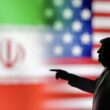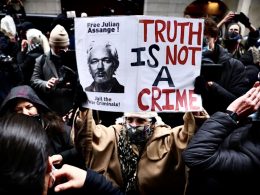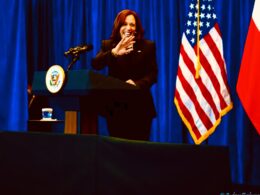Above: a display put on by NDN Collective, the Bezos-funded NGO
To understand why and how the concept of anti-colonialism has come to be pitted against anti-imperialism, one needs to understand the historical context in which the elites have done this. For such a piece of discourse manipulation to have been possible, the U.S. left needed to become detached from the actual class struggle, and from the masses which are crucial towards driving this struggle. The elements of the left that we today see attacking anti-imperialists, under the belief that this is necessary for advancing “anti-colonialism,” are functioning in a different situation from that of effective anti-colonialists like Burkina Faso’s Ibrahim Traoré. Traoré is winning because he’s not advancing the ultra-left version of “anti-colonialism,” which places anti-colonialism as in conflict with anti-imperialism by taking out the former’s anti-imperialist elements. He’s embraced multipolarity, building a relationship with Russia; which is what his people want, as the bulk of them have intuitively recognized Russia is their friend in the anti-colonial struggle.
This goes against what the imperialist academic institutions, and by extension the many compromised parts of the “left” within the exploiting countries, claim to be anti-colonialism. According to them, being principled on decolonization means wanting to break Russia up into numerous new ethnic nation-states, which would ironically let Washington recolonize that part of the world. Like how the Zionists call their settler state a “Land Back” project simply because Jewish people have historically lived in Palestine, the new cold warriors are abusing history for their own malign purposes, selling colonization as decolonization. Any successful anti-imperialist disregards these twisted “decolonization” theories from the imperialists, and recognizes that there’s no conflict between anti-colonialism and anti-imperialism.
The problem faced by the class struggle in the empire’s core is that since the death of the old left, the default elements of “Marxism” here have adopted the equivalent of these misleading bourgeois “decolonial” theories. They’ve repeated that same practice of taking key parts of anti-imperialism out of anti-colonialism, and then portraying anti-imperialists as being opposed to anti-colonial liberation.
When applied to the conditions of the United States, this manipulation strategy has involved more than vilifying U.S. imperialism’s geopolitical challenges as colonizers. U.S. ultra-leftists often repeat such propaganda about countries like China and Russia, but they also promote an ahistorical narrative about the society in which they themselves live. This is the narrative that the masses within the core of imperialism are fundamentally reactionary, and therefore Marxists must isolate themselves to left-liberals (which are seen as the safest parts of the masses). If anybody challenges this self-constrained mode of operating, and tries to build a real relationship between Marxists and the masses, then they’re labeled a reactionary and cast out.
What modern U.S. leftism and “Marxism” have done is standardize the same ultra-left ideology that Henry Winston observed the bourgeoisie were inserting into radical thought during the 1960s. This thinking ignores the differences between the conditions of foreign colonies, and the conditions of oppressed peoples in the empire’s core. Which, as Winston concluded, leads radicals to reject the alliances with the white workers that have historically been necessary for building effective movements in the United States. (Note that though Winston is here discussing the country’s Black population, his point about how minorities can’t win by isolating themselves from the majority applies to any other given minority group, and to political minorities such as Marxists.) Wrote Winston:
For colonial peoples, liberation starts with rejection of the myth that their fate can be determined “jointly” within the framework of the tight controls that link it to the U.S. economy. For the Black people in the US, on the other hand, liberation is realizable only on the basis of overcoming exclusion and inequality through an anti-monopoly movement, in which the Black people and all who are exploited by the common corporate enemy seek to establish joint control of the country’s economy, It is within such a revolutionary process that Black people will gain full and equal participation in the entire economy, and equality of representation in all aspects of the social, political, economic and governmental life of the country. The ideology of separatism, of determining “Black destiny” on a go-it-alone path—rejecting united action with non-Black opponents of monopoly power—is in today’s context equivalent to the idea of emigration to Canada or Africa counterposed by some as an alternative to Douglass’ strategy of forming an anti-slave power coalition—the strategy which did ultimately bring an end to chattel slavery.
That’s how leftism in the U.S. has been eating itself over the last half century: by wilfully cutting itself off from the broad masses. From not just the bulk of the white workers, but anybody who doesn’t accept the dogmatic theories which leftists often latch onto. This makes it so that the “left” can only exist as a space of opportunism and sectarian infighting. There is a solution to this, but it’s not a solution that will be embraced by the actors who’ve invested themselves in the New Left’s concept of “Land Back.”
The old left, and the modern carriers of its traditions, are totally compatible with African and Native liberation. Black and Native peoples are part of the masses, therefore their particular interests and needs are part of a mass-centered practice. The reason why Marxists who seek to escape New Left dogmas don’t represent themselves with the “Land Back” label is because elite capture has rendered it counterproductive to use that label. Because even if it’s not one’s intention to portray the people as fundamentally reactionary, using this label reinforces such ideas. It’s the elites and their “decolonial” NGOs that have come to define the discourse within this arena, so we must be careful not to unwittingly aid in their discourse psyops.
The solution to this issue of co-optation is a return to the old communist strategy of centering the masses. Which means building alliances with groups that represent parts of the masses outside the “left” niche, including and especially when those within that niche get upset about us doing so. When the actors with an interest in gatekeeping the class struggle dislike what we’re doing, that’s a good sign, not a bad sign. They’ll use scandal-mongering about “red-brown alliances” to try to convince you that deviating from their insular model is wrong, and that they’re the authorities you should defer to without question. But if they were worth taking advice from, their mode of practice wouldn’t be the thing that’s kept the class struggle stagnant for decades.
The PSL, the CPUSA, and their adjacent groups are the predominant socialist orgs during this era because they’ve designed themselves to perpetuate an inward focus within organizing. Which has kept them safe from the intense degree of state repression and smears that the liberal establishment would otherwise be directing towards them. This is why when they present themselves as the ones which are capable of bringing anti-colonial liberation, it’s an empty promise. They’re entities of managed opposition, not willing to do anything that upsets the liberal NGOs they get their funding from.
By using the idea of anti-colonialism to sell their opportunist projects, they’re carrying on a century-long tradition by revisionists of peddling “decolonization” theories that are compatible with imperialism. As the Soviet authors from this compilation of resources on “decolonization theory” observe about how the imperialists have historically distorted anti-colonialism:
Decolonisation is a false apologetic “theory”, advocated by bourgeois and opportunistic economists and politicians, who maintain that imperialism contributes to the industrial development of colonies and thus, allegedly weakens their dependence on the metropolitan countries, or “decolonises” them. JV Stalin exposed the reactionary nature of these fabrications [Vtoroe Izdanie]…The real purpose of the decolonisation theories is dictated by the social task of the imperialist bourgeoisie: to promote the preservation of the economic dependence of the developing countries, to keep them within the framework of the world capitalist economy, and to influence the path of their development, thus extending a new form their colonial domination [Soviet Encyclopedia]
By portraying hostility towards the majority of the people as the only true kind of anti-colonialism, modern U.S. leftism is using that same tactic of disguising reactionary politics as something progressive. To win, Marxists are going to need to embrace the path of Douglass and Winston, in which those fighting for justice form alliances with all the elements that are compatible with their goals.
————————————————————————
If you appreciate my work, I hope you become a one-time or regular donor to my Patreon account. Like most of us, I’m feeling the economic pressures amid late-stage capitalism, and I need money to keep fighting for a new system that works for all of us. Go to my Patreon here.
To keep this platform effective amid the censorship against dissenting voices, join my Telegram channel.








